
Gaza: Study Reveals Unprecedented Losses of Life & Life Expectancy
Researchers from MPIDR & the Centre for Demographic Studies (CED) investigated the impact of the conflict in Gaza on mortality. Life expectancy 2024 fell to nearly half the level expected without the war. www.demogr.mpg.de/go/GazaLE
25.11.2025 10:11 — 👍 34 🔁 20 💬 1 📌 2

Why did I visit the Facebook pages of 5500 German grocery stores on a grey lockdown day ca. 2021?
You can now find out in AJS.
Our work on ethnoreligious infrastructures is finally online in the ominous Volume 0:
www.journals.uchicago.edu/doi/10.1086/...
24.11.2025 12:03 — 👍 39 🔁 16 💬 2 📌 0

Embryo selection based on polygenic prediction risks reinforcing social inequality
The rise of companies offering embryo selection based on genetic testing has triggered heated debate about ethical acceptability, as well as the accuracy and scientific validity of these techniques. W...
There’s a new kid in town!
Companies are now selling IVF and embryo selection based on genetic testing for traits related to health and even intelligence.
We outline methodological and ethical concerns, and warn against risks for social inequality.
With the fantastic @gaiaghirardi.bsky.social
13.11.2025 08:09 — 👍 38 🔁 18 💬 1 📌 4
New publication with @riazsascha.bsky.social in @bjpols.bsky.social
As I’m concerned that the figures in the SI might get too little attention, here are some findings in visual form:
04.11.2025 14:56 — 👍 29 🔁 8 💬 0 📌 0
New paper with @mhamjediers.bsky.social
German judges have discretion to apply rehabilitative juvenile criminal law (Jugendstrafrecht) or punitive adult criminal law to 18–20-year-old offenders. We show that immigrant youths are ~10 percentage points less likely to be sentenced under juvenile law
04.11.2025 11:20 — 👍 99 🔁 45 💬 3 📌 4
Always enjoy any kind of discussion with you - whether they spark papers like this one or not
04.11.2025 13:41 — 👍 1 🔁 0 💬 0 📌 0
I could see how this could make sense in the revision phase, if it's also clearly communicated to the reviewers, potentially bounding extensive comments and enforcing both parties to stick to the core of a project.
But why you would do this for initial submissions seems also senseless to me
01.11.2025 10:01 — 👍 2 🔁 0 💬 1 📌 0
why do journals restrict the number of pages of the online supplementary material? I am confused! 😅
01.11.2025 08:57 — 👍 5 🔁 1 💬 1 📌 0
🚨 Applications Now Open for the EUI PhD Programmes 2026-2027!
📊 Economics |⚖️ Law |📘 History | 🏛 Political and Social Sciences
Join the EUI's 50th PhD cohort!
Apply by 15 January 2026 (14:00 CET) for the academic journey of a lifetime! 👉: eui.eu/phd
#EUIPhD #PhDOpportunity
01.11.2025 01:15 — 👍 45 🔁 60 💬 0 📌 9


New article out in @sociusjournal.bsky.social.
It shows how closely linked motherhood penalties 🤰📉 and gender inequalities 👨💼💰👩💼 are by studying many local labour markets.
Thread 👇
journals.sagepub.com/doi/10.1177/...
13.10.2025 16:37 — 👍 105 🔁 39 💬 3 📌 3
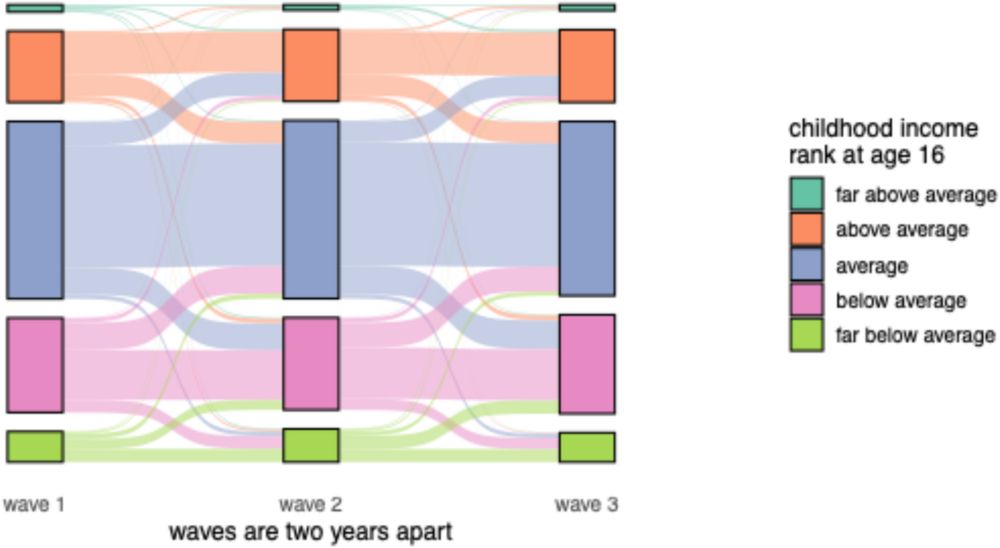
Growing up Different(ly than Last Time We Asked): Social Status and Changing Reports of Childhood Income Rank - Social Indicators Research
How we remember our past can be shaped by the realities of our present. This study examines how changes to present circumstances influence retrospective reports of family income rank at age 16. While retrospective survey data can be used to assess the long-term effects of childhood conditions, present-day circumstances may “anchor” memories, causing shifts in how individuals recall and report past experiences. Using panel data from the 2006–2014 General Social Surveys (8,602 observations from 2,883 individuals in the United States), we analyze how changes in objective and subjective indicators of current social status—income, financial satisfaction, and perceived income relative to others—are associated with changes in reports of childhood income rank, and how this varies by sex and race/ethnicity. Fixed-effects models reveal no significant association between changes in income and in childhood income rank. However, changes in subjective measures of social status show contrasting effects, as increases in current financial satisfaction are associated with decreases in childhood income rank, but increases in current perceived relative income are associated with increases in childhood income rank. We argue these opposing effects follow from theories of anchoring in recall bias. We further find these effects are stronger among males but are consistent across racial/ethnic groups. This demographic heterogeneity suggests that recall bias is not evenly distributed across the population and has important implications for how different groups perceive their own pasts. Our findings further highlight the malleability of retrospective perceptions and their sensitivity to current social conditions, offering methodological insights into survey reliability and recall bias.
The GSS asked the same people about their childhood income rank three different times. 56% changed their answer, even though what was trying to be measured couldn’t change! We dig into this in a new article at @socialindicators.bsky.social.
doi.org/10.1007/s112...
🧵👇 (1/5)
10.10.2025 14:05 — 👍 95 🔁 40 💬 2 📌 5
This important paper shows a precipitous drop in girls' achievement in recent years, closing a third of the gap with boys.
Covid doesn't seem to be the smoking gun, but tiktok may be
10.10.2025 08:19 — 👍 46 🔁 13 💬 1 📌 1

And the 1st Replication Award of the Academy of Sociology goes to..
Sergio Lo Iacono, Wojtek Przepiorka, Vincent Buskens, Rense Corten, Marcel van Assen, and Arnout van de Rijt
for "The competitive advantage of sanctioning institutions revisited: A multilab replication"
#AkadSoz25 #sociology
1/
09.10.2025 10:18 — 👍 29 🔁 8 💬 4 📌 3
Why Civil and Military Conscription Deserve a Second Look – The Journal of Politics Blog
"Why Civil and Military Conscription Deserve a Second Look" by Sven Altenburger. (@svenaltenburger.bsky.social)
ubwp.buffalo.edu/jopblog/2025...
08.06.2025 22:22 — 👍 4 🔁 2 💬 0 📌 0

Did military service in Europe affect men's occupational choices? @mhamjediers.bsky.social presenting at #ECSR2025, very focused and passionate about research, as usual.
We investigate selection into armed forces, licensed and male-dominated occupations across multiple countries.
05.09.2025 15:56 — 👍 32 🔁 5 💬 0 📌 0
😅
I totally agree. Would be great if other surveys have been in the field and I will keep my eyes open 🧐
29.08.2025 16:25 — 👍 1 🔁 0 💬 0 📌 0
Thanks for the input. It would have been great to do this with some other countries as well, however, the design builds on surveys being in the field at that time, which unfortunately applied only to Czechia and Uruguay. And yes, they substantially differ in their historical connection to Russia...
29.08.2025 16:16 — 👍 1 🔁 0 💬 1 📌 0
This argument builds heavily on the linked paper by
@alexsorg.bsky.social @wolfgangwagner.bsky.social and @profonderco.bsky.social
29.08.2025 12:25 — 👍 2 🔁 0 💬 0 📌 0
In the context of debates on military capacities, this small research note uses the exact date of Russia’s invasion of Ukraine as an unexpected event during a survey to corroborate that willingness to fight rises with proximity to conflict (cf. doi.org/10.1017/eis.2025.12)
Any feedback is welcome!
29.08.2025 12:24 — 👍 7 🔁 2 💬 2 📌 1
This is the most interesting opinion piece I have read on the topic of polygenic embryo screening!
The "having" and "doing" of motherhood, the concrete practicalities of IVF, the blur between traits and diseases, etc.
Highly recommended reading.
12.08.2025 15:35 — 👍 9 🔁 3 💬 0 📌 0
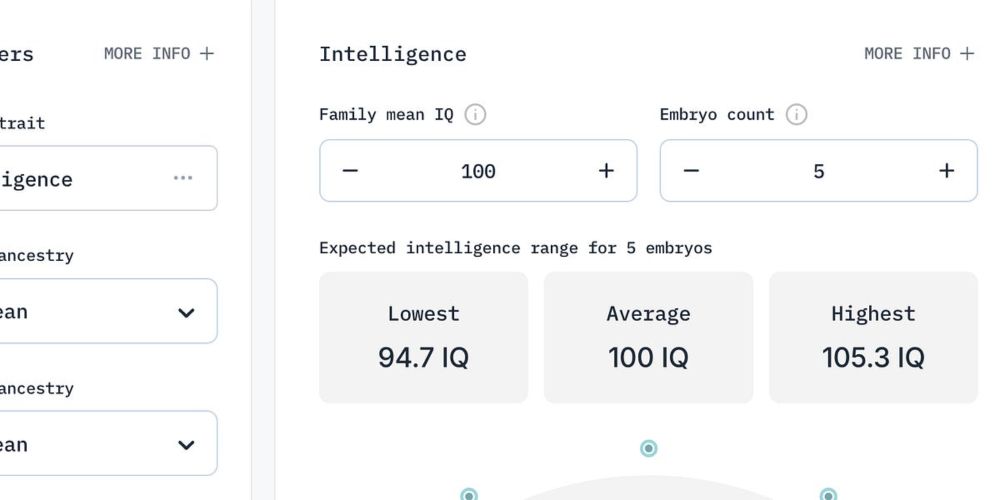
The New Eugenics Companies
Oops, I meant to say generational health and embryo selection
New blog post: The New Eugenics Companies
(Oops, I meant to say generational health and embryo selection)
09.08.2025 17:10 — 👍 72 🔁 31 💬 2 📌 7
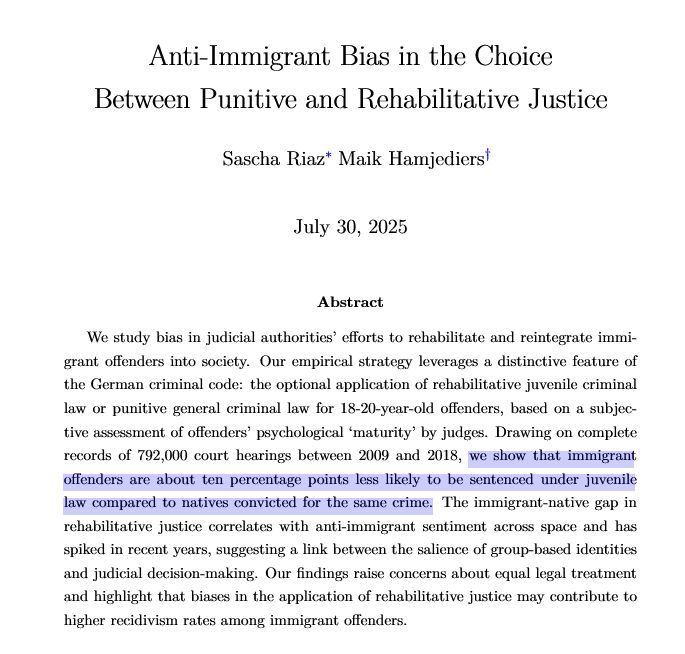
Anti-immigrant bias in the German criminal justice system: who would have thought?
osf.io/preprints/so...
30.07.2025 11:45 — 👍 72 🔁 23 💬 3 📌 2
In our new article, Jens Beckert and I ask how "Capital and the Family" interconnect in contemporary capitalism. We argue that they come together in owning relations - and are crucial to today's economy. Read more in @bjsociology.bsky.social
onlinelibrary.wiley.com/doi/10.1111/...
29.07.2025 16:31 — 👍 27 🔁 10 💬 0 📌 0
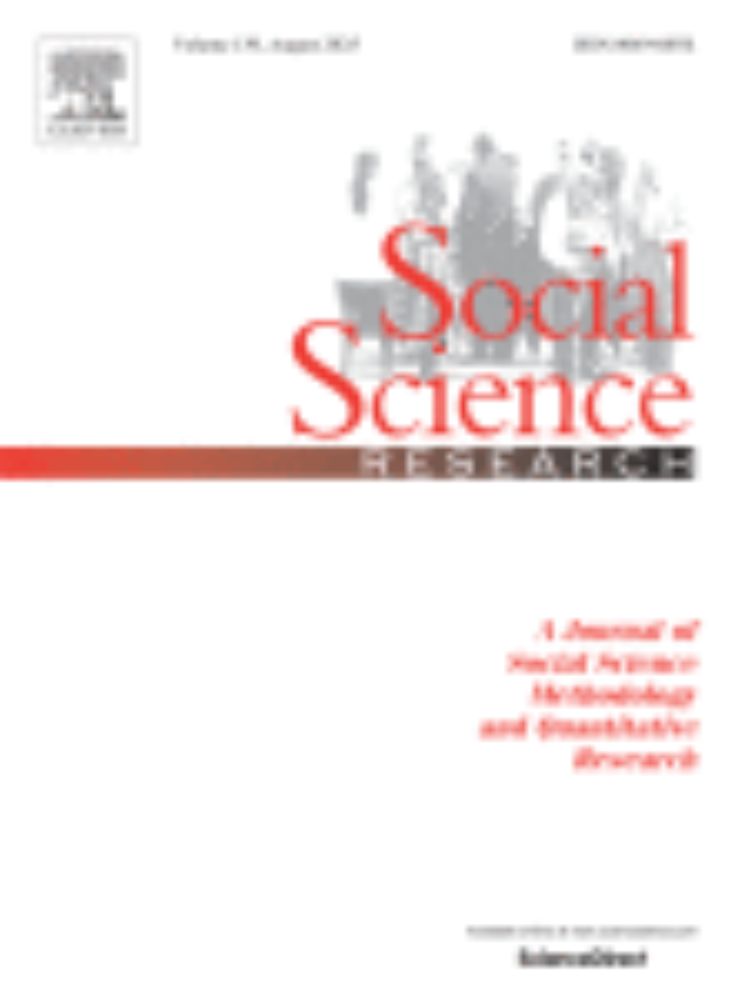
The uneven effects of gender parity: Trends in gender homophily in scientific publications, 1980–2019
This study examines gender collaboration patterns across male-dominated, gender-neutral, and female-dominated fields. Using data from the Web of Scien…
Thrilled to share our paper with Iñaki Úcar (@enchufa2.es) and Jesús Prieto, just out in Social Science Research!
📝 The uneven effects of gender parity: Trends in gender homophily in scientific publications, 1980–2019
Free to download for the next 50 days: www.sciencedirect.com/science/arti...
29.07.2025 09:03 — 👍 28 🔁 10 💬 3 📌 0
Kicking off the summer break with #EUIResearch ☀️
🚻 @mhamjediers.bsky.social, Max Weber Fellow @eui-sps.bsky.social, explores how gendered norms on caregiving & commitment shape workplace dynamics. 👉 https://loom.ly/vO7QtrA
28.07.2025 02:30 — 👍 15 🔁 3 💬 0 📌 0
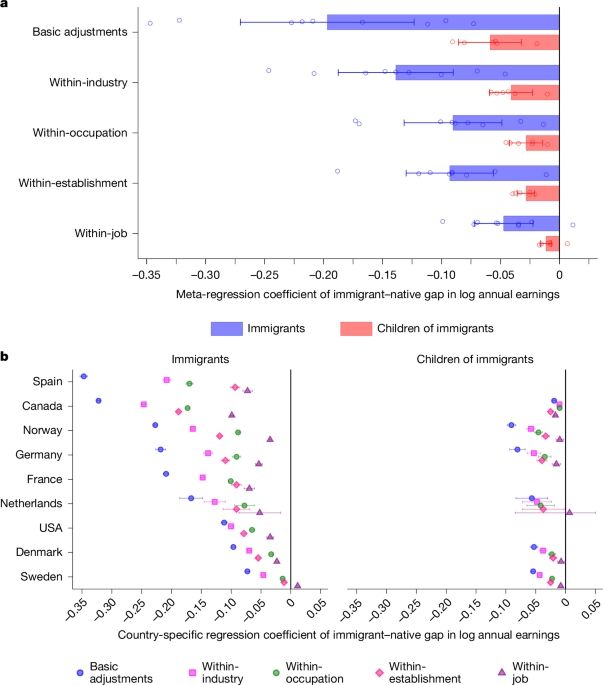
Immigrant–native pay gap driven by lack of access to high-paying jobs - Nature
Data from nine European and North American countries reveal that the disparity in earnings between immigrants and natives is largely a result of segregation of immigrant workers into lower-paying jobs...
IN OTHER NEWS: check out our new COIN paper on immigrant--native pay gaps in advanced economies published in @nature.com this afternoon! Specifically, we study the relative contribution of within-job unequal pay vs between-job segregation to earnings disparities across immigrant generations. 1/9
16.07.2025 15:16 — 👍 65 🔁 28 💬 4 📌 2
Professor of Sociology at University of Copenhagen. I study how immigration transforms societies. Diversity | Integration | Discrimination | Misperceptions
Assistant Prof. in European Politics at LSE
Prev. Postdoc at Yale & PhD from Humboldt Uni Berlin | Environmental politics, political behaviour, political elites.
antoniovalentim.github.io
postdoc at EUI, PhD from CEU ■ representation, political behavior, distributive politics, local ties ■ usually on a bike, a night train, or al banco
Postdoc @wzb.bsky.social | PhD @eui-eu.bsky.social | Migration and Integration | Digitalisation | Social Networks | Social Status | he/him 🌈
https://taekyeong-my.github.io/
Sociologist and demographer, University of Maryland; SocArXiv director.
New book: Citizen Scholar: Public Engagement for Social Scientists https://cup.columbia.edu/book/citizen-scholar/9780231555418
Website: philipncohen.com
Blog: familyinequality.com
DPhil student at Blavatnik School of Government and Nuffield College | political economy, interest groups, business power, climate change | he/him
https://jonas-fischer.de
Political Science PhD Researcher at EUI
Postdoc at FGV/EAESP. Previously Max Weber Fellow at EUI | Studying elites' consequences to public transparency, electoral competition, affective polarization and SLBs.
rochavirginia.com
Assistant Professor · Institute of Security and Global Affairs at Leiden University · politics & practice of international law · security & human rights · peace & security orders
Institute of Sociology · University of Bern
Describing, understanding, and shaping society
🔗 www.soz.unibe.ch
🔗 https://lnk.bio/soziologie.unibe
Doctoral Researcher in Political Science @dynamics.bsky.social & Research Associate @hertieschool.bsky.social | Sometimes working at Zeit Online | Interested in political geography, inequality and elections.
PhDing @BiB & @uni-hamburg.de, Working on Well-Being, Spatial Mobility, and Inequality. Picture by MPIfG/AD, he/him. Views my own.
www.eliashofmann.eu
What has place to do with social inequality? PostDoc in Sociology @Institute for Employment Research (IAB) investigating this link in using geodata and CSS
https://sites.google.com/view/kerstin-ostermann/start
Wir unterstützen Journalistinnen und Journalisten mit frei nutzbaren Statements und Hintergrundinformationen aus der #Wissenschaft. Und wir entwickeln neue Werkzeuge für den digitalen #Wissenschaftsjournalismus.
https://sciencemediacenter.de
Science editor & presenter / Deutschlandfunk / Systemfragen / public audio broadcasting / communication theory meets „reality“ / 1 aus 100 (promoviert, Nichtakademiker-Kind) + schreibt dazu manchmal was / Dancing Wittgenstein
Institute for Advanced Study in Toulouse 🇫🇷
Interdisciplinary research hub aiming to understand fundamental determinants of human behaviour. #IASToulouse #FriendsOfIAST @tse-fr.eu
Assistant Prof @unil.bsky.social / Co-Editor of @epa-journal.bsky.social + @rpr-journal.bsky.social / Public Policy, Comparative Politics, Health Policy, Political Psychology
PhD Student in Sociology at EUI
A bot for BlueSky that posts xkcd comics, shows the alt text, and links to the Explain xkcd site.
By @perevillega.com

















